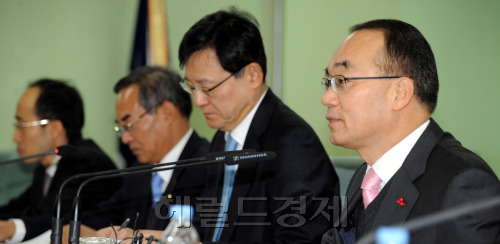Officials believe fundamentals are strong enough to weather short-term volatilities
Seoul shares surged 3.09 percent Wednesday on positive U.S. housing data, ending earlier losses from Kim Jong-il’s death as a brief technical decline. The benchmark KOSPI advanced 55.35 points to close at 1,848.41, extending gains for the second day after posting its sharpest loss in six weeks Monday on the death of the North Korean leader. The local currency advanced 14.5 won against the U.S. dollar to close at 1,147.7 won, posting gains for the second day.
“The better than expected U.S. housing data and easing debt situation in the euro zone were enough to lift KOSPI up by more than 3 percent. This, once again, is showing that losses from geopolitical uncertainties are short-lived for most of the time,” said Kim Chul-jung, an analyst at Korea Investment & Securities.
 |
Finance Minister Bahk Jae-wan (right) speaks at an emergency economic meeting in Seoul on Wednesday. (Chung Hee-cho/The Korea Herald) |
“We expect the KOSPI to rise up to 1,900 should concerns on the North Korean regime stay at this level with no other abrupt events,” Kim said.
Kim also attributed the strong performance of blue chips to the positive U.S. data as payrolls increased in 29 states in November. Asian exporters enjoyed a broad gain after Spain successfully sold $7.38 billion of bonds, higher than the maximum target. Stocks opened sharply higher, jumping 2.27 percent in the first 15 minutes of trading.
Banking and shipping firms led the gains, with Hyundai Merchant Marine Co. advancing 4.53 percent and Shinhan Financial Group adding 6.3 percent. Oil refiners rose, with S-Oil jumping 5.32 percent and SK Innovation and GS Caltex adding 4.23 percent.
The government continued its effort to stabilize the market and emphasized that its fundamentals are strong enough to weather short-term volatilities caused by Kim’s death.
“Financial markets at home and abroad fluctuated somewhat after the news of North Korean leader Kim’s death but they are showing signs of regaining stability quickly,” Finance Minister Bahk Jae-wan told a crisis management meeting
Deputy Finance Minister Kang Ho-in said the ministry expects little economic impact from Kim Jong-il’s death, citing no changes in prices of main goods and services.
“We assess short-term volatilities caused from Kim’s death as smaller than those from the sinking of the warship Cheonan and the shelling of Yeonpyeong Island,” Kang told reporters at a news conference earlier in the day.
By Cynthia J. Kim (
cynthiak@heraldcorp.com)








